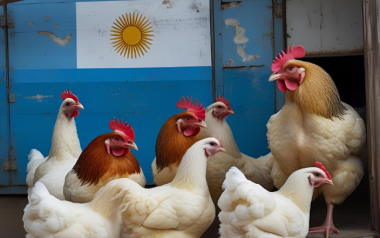Sources: Available upon request
25 Aug 2025
China suspends Argentina’s poultry exports over Avian Flu
Argentina’s poultry industry has once again lost access to the Chinese market, following the detection of highly pathogenic avian influenza (HPAI) at a commercial farm in Buenos Aires.
Argentina’s poultry industry has once again lost access to the Chinese market, following the detection of highly pathogenic avian influenza (HPAI) at a commercial farm in Buenos Aires. The suspension, announced on August 20, 2025, comes just five months after China lifted a previous two-year ban on Argentine poultry imports.
- The Chinese customs authority issued the suspension without specifying its duration.
- Argentina’s National Service of Agri-Food Health and Quality (Senasa) confirmed that exports will remain halted until at least 28 days after the outbreak is contained, and the affected facilities undergo thorough cleaning and disinfection.
China is a critical market for Argentina’s poultry sector, particularly for by-products like chicken feet and wings, which have limited demand elsewhere. In 2023, China accounted for nearly half of Argentina’s poultry by-product exports, valued at around USD 170 million. The renewed ban poses a significant economic challenge for producers and exporters already grappling with inflation and high borrowing costs.
- The impact on global poultry prices, however, may be muted.
- Analysts note that China currently has a surplus of poultry meat and is facing financial strain in its domestic industry.
- From January to July 2025, Chinese poultry imports fell by 2% compared to the same period in 2024.
This latest suspension is part of a broader tightening of import controls by China in response to avian flu outbreaks. Since May 2025, Beijing has also halted poultry imports from Brazil—its largest supplier—and from Spain earlier this month.
The situation underscores the vulnerability of global agricultural trade to health crises. Argentina’s government is working to restore access to the Chinese market, but the industry faces renewed uncertainty. The ban also highlights the importance of biosecurity measures and rapid response protocols in maintaining international trade relationships.
As Argentina navigates this setback, the broader implications for global food supply chains and trade dynamics remain significant. The country’s ability to rebound will depend not only on disease containment but also on diplomatic and economic agility in a shifting global landscape.









































